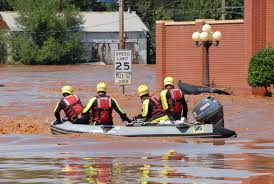Climate Adaptation
Louisiana Flood Lessons for a Climate-Changed Future
Louisiana’s preparedness for a 1000-year flood, and implications of the slow media response for slow-onset climate impacts
The devastating floods in southern Louisiana a week ago left at least 13 people dead, tens of thousands in need of rescue, and 60,000 homes damaged. In one parish, nearly ninety percent of homes flooded. Cellular network failures, road closures, power outages, and sewage-contaminated floodwaters continue to threaten relief efforts. The American Red Cross is …
Continue reading “Louisiana Flood Lessons for a Climate-Changed Future”
CONTINUE READINGThe New NEPA Guidance
The new guidance on climate change is a step forward, though it could have been stronger.
The White House Council on Environmental Quality (CEQ) issued new guidance today on considering climate change in environmental impact statements. Here are the key points: Quantification. The guidance recommends that agencies quantify projected direct and indirect emissions, using the amount of emissions as a proxy for the eventual impact on climate change. The EIS should also …
Continue reading “The New NEPA Guidance”
CONTINUE READINGDo water managers’ perceptions influence innovation?
New survey probes the innovation deficit
Climate change and population growth are rapidly increasing stress on our water systems, challenging their ability to deliver critical services. To respond to this, we need more than simple course adjustments in how we manage our water – we need entirely new paradigms that will improve resource efficiency and support more sustainable urban water systems. Considerable …
Continue reading “Do water managers’ perceptions influence innovation?”
CONTINUE READINGThe National Park Service and Climate Change
Does the agency have the legal tools to respond to climate change?
This past weekend President Obama visited Yosemite, helping the National Park Service celebrate its 100th anniversary. As part of his remarks, the President noted that climate change is already causing major impacts on the resources in National Parks around the country—for instance, causing the disappearance of the glaciers in Yosemite and increasing fire risks in …
Continue reading “The National Park Service and Climate Change”
CONTINUE READINGA Sea Change in Climate Politics
Something strange has happened in Florida: Rising seas have changed GOP views.
There was a surprise question about climate change at the last Republican debate. What was surprising wasn’t the question itself. Instead, it was the source of the question: Tomás Regalado, the Republican mayor of Miami. It turns out that this wasn’t a fluke. Regalado and the Republican mayor of Miami Beach have spoken out in an …
Continue reading “A Sea Change in Climate Politics”
CONTINUE READINGRisk Subsidies and the Future of Nuclear Power in the U.S.
Should We Take Into Account Government Subsidies that Reduce the Risks Borne by the Nuclear Industry as We Consider Our Energy Future?
As I’ve written about before, U.S. law massively subsidizes the nuclear power industry. In particular, a law called the Price-Anderson Nuclear Industries Indemnity Act dramatically skews the incentives to develop nuclear plants, and to site them in places where there is a lot of risk, because it requires the public to bear much of the …
Continue reading “Risk Subsidies and the Future of Nuclear Power in the U.S.”
CONTINUE READINGReflections on the Coastal Commission’s Implosion
The Implications of the Decision to Fire Charles Lester – and the Decision Not to Explain It
As Rick Frank insightfully discussed earlier this week, the California Coastal Commission has fired its former executive director, Charles Lester. Readers interested in more background information and analysis should read Rick’s post, as well as the excellent reporting by Tony Barboza and others from the LA Times. (And anyone who wants to hear about it …
Continue reading “Reflections on the Coastal Commission’s Implosion”
CONTINUE READINGHow do we move past the yuck factor in potable water reuse?
This post draws on two recently published articles (here and here) by an international group of collaborators: Christian Binz, Sasha Harris-Lovett, Bernhard Truffer, David Sedlak, and myself, courtesy of the ReNUWIt program. Potable water reuse is increasingly seen as a potential way to help ease urban water supply challenges. Potable reuse is as it sounds …
Continue reading “How do we move past the yuck factor in potable water reuse?”
CONTINUE READINGNEWSFLASH: Paris Agreement Adopted
FINALLY, a global agreement to move forward.
The Paris agreement has now been adopted. As the Washington Post reports: “Negotiators from 196 countries approved a landmark climate accord on Saturday that seeks to dramatically reduce emissions of the greenhouse gases blamed for a dangerous warming of the planet. The agreement, adopted after 13 days of intense bargaining in a Paris suburb, puts …
Continue reading “NEWSFLASH: Paris Agreement Adopted”
CONTINUE READINGEmmett Institute updates from the Climate Conference
UCLA faculty and students participating in COP21/CMP11
For two weeks starting today, negotiators gather in Paris for the annual climate-change meetings – officially, the 21st Conference of the Parties to the UN Framework Convention on Climate Change, and the 11th Meeting of the Parties to the Kyoto Protocol (COP 21/CMP11). The meeting is located in a sprawling conference center at the edge …
Continue reading “Emmett Institute updates from the Climate Conference”
CONTINUE READING









